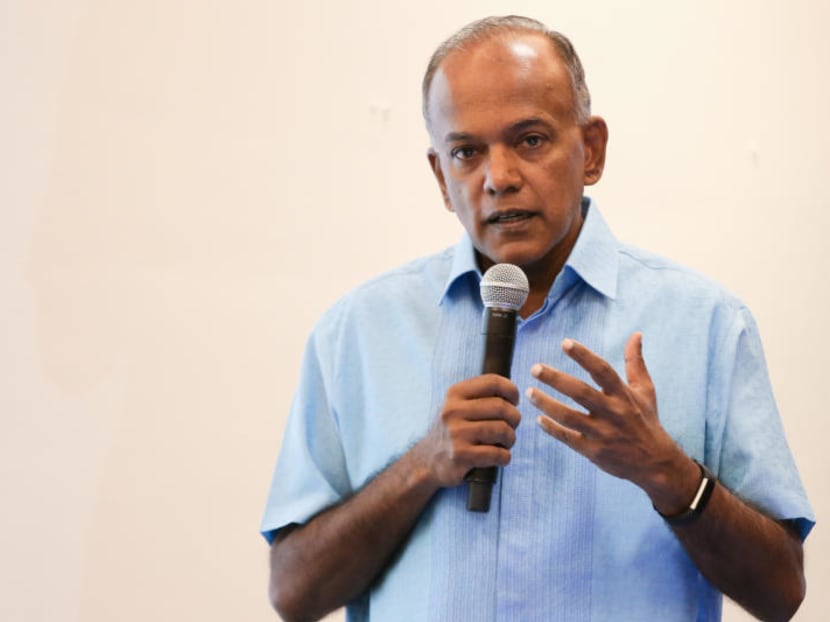Appeals process should be ‘simple’ and ‘relatively inexpensive’: Shanmugam on online falsehoods law
SINGAPORE — The process for a person or organisation to appeal against a direction order issued by a Singapore minister under the proposed Protection from Online Falsehoods and Manipulation Act (POFMA) should be “fast”, “simple” and “relatively inexpensive”, said Law Minister K Shanmugam on Tuesday (Apr 9).

The intention is to make the process simple so that people will not need a lawyer, Mr Shanmugam said.
SINGAPORE — The process for a person or organisation to appeal against a direction order issued by a Singapore minister under the proposed Protection from Online Falsehoods and Manipulation Act (POFMA) should be “fast”, “simple” and “relatively inexpensive”, said Law Minister K Shanmugam on Tuesday (Apr 9).
Mr Shanmugam said it is a similar approach to proposed amendments to another law – the Protection from Harassment Act (Poha) – which were tabled on Apr 1.
He was speaking during a dialogue session organised by the Association of Muslim Lawyers (AML) and non-profit organisation Wise SG.
The minister pointed out that the Poha has been in existence for a while, and he has been meaning to amend it to make the processes “much faster and to reduce the cost very substantially”.
The Poha amendments include creating a new Protection from Harassment Courts, which will be a specialised court with oversight over all criminal and civil matters under this law.
It will also have simplified procedures with expedited timelines for certain types of applications, including claims for damages up to S$20,000, as well as applications for Protection Orders and Expedited Protection Orders.
In terms of timelines, Mr Shanmugam had shared some of his thoughts on the Poha in February at an event of family violence specialist centre Pave. He said then the courts told his ministry that for an Expedited Protection Order, they will aim to hear these within 48 to 72 hours of the application.
Where there is a risk of violence or actual violence, the courts will try to hear the application within 24 hours, he added.
“We intend to take a similar approach (for POFMA): Make it quick and make it as inexpensive as possible,” said Mr Shanmugam, who is also the Home Affairs Minister.
He said he intends to prescribe the timelines and the amount people will have to pay when it comes to appealing to the High Court against the directions issued by a minister about a deliberate online falsehood. The details are expected to be announced during the second reading of the proposed legislation.
The intention is also to make the process simple so that people will not need a lawyer, Mr Shanmugam said.
“Of course people can employ lawyers, but we want to try and make the process such that even if you didn’t have that lawyer, you can go in and post in a form and it sets out your position,” he explained.
"We want to try and make it fast and relatively inexpensive."
The proposed law stated that no appeal may be made to the High Court unless the person had first applied to the minister who issued the direction, and the latter had refused the application whether in part or in whole.
The cost and time taken for the appeal process had been brought up as a point of concern.
During the question-and-answer period of the dialogue session, Mr Shanmugam also addressed the issue of why ministers are going to be given the power to issue directions against deliberate online falsehoods, and whether a third-party body is better served to function in this role.
The minister said the issue would be one of accountability, as the ministers can be questioned in Parliament by other MPs and they can also be questioned in the court of law.
Mr Shanmugam also queried the formation of a third-party body to determine when directions need to be issued against falsehoods, asking who will appoint its members. If it is the Government, then the same issues will be raised again, he said.
There is also the fact that these ministers are elected officials, and the decisions they make could also be reflected by people’s votes during a General Election.
“Then you stand or fall by your decisions,” Mr Shanmugam said.
More than 160 guests including senior religious leaders, principals, senior educators and students from polytechnics, junior colleges and madrasahs attended the dialogue on Tuesday, according to the press release by AML and Wise SG. CNA









